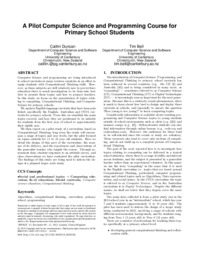A Pilot Computer Science and Programming Course for Primary School Students Publikationsdatum:
Zu finden in: Proceedings of the Workshop in Primary and Secondary Computing Education, WiPSCE 2015, London, United Kingdom, November 9-11, 2015 (Seite 39 bis 48), 2015
|
 |
 Zusammenfassungen
Zusammenfassungen
Computer Science and programming are being introduced to school curricula in many western countries in an effort to equip students with Computational Thinking skills. However, as these subjects are still relatively new to pre-tertiary education there is much investigation to be done into how best to present these topics and how to prepare teachers. In this study we focus on the presentation of topics relating to computing, Computational Thinking, and Computer Science for primary schools.
We analyse English-language curricula that have been published, specifically the English, Australian and CSTA curricula for primary schools. From this we establish the main topics covered, and how they are positioned to be suitable for students from the first year of school to approximately their eighth year.
We then report on a pilot study of a curriculum based on Computational Thinking; long term the study will encompass a range of topics and year levels, but the pilot focused on topics suitable for 11 to 12 year old students. Here we detail the design of this part of the curriculum, the manner of its delivery, and the experiences and observations of the generalist teacher who taught the course. Through assessment data, student responses to an attitude survey, and class observations we have evaluated the pilot curriculum. The findings of this study are being used to inform the design of a planned larger scale study.
 Dieses Konferenz-Paper erwähnt ...
Dieses Konferenz-Paper erwähnt ...
 Dieses Konferenz-Paper erwähnt vermutlich nicht ...
Dieses Konferenz-Paper erwähnt vermutlich nicht ... 
 Nicht erwähnte Begriffe | DigComp 2.0, Lehrplan 21 |
 Tagcloud
Tagcloud
 Zitationsgraph
Zitationsgraph
 Zitationsgraph (Beta-Test mit vis.js)
Zitationsgraph (Beta-Test mit vis.js)
 Zeitleiste
Zeitleiste
 9 Erwähnungen
9 Erwähnungen 
- Analysis of Scratch Projects of an Introductory Programming Course for Primary School Students (Alexandra Funke, Katharina Geldreich, Peter Hubwieser) (2017)


- Proceedings of the 12th Workshop on Primary and Secondary Computing Education, WiPSCE 2017, Nijmegen, The Netherlands, November 8-10, 2017 (Erik Barendsen, Peter Hubwieser) (2017)
- Teaching How to Teach Computational Thinking (Anna Lamprou, Alexander Repenning) (2018)


- Proceedings of the 13th Workshop in Primary and Secondary Computing Education, WiPSCE 2018, Potsdam, Germany, October 04-06, 2018. (Andreas Mühling, Quintin I. Cutts) (2018)
- Medienpädagogik und Didaktik der Informatik - Eine Momentaufnahme disziplinärer Bezüge und schulpraktischer Entwicklungen (2018)
- Scalable Game Design Switzerland (Alexander Repenning, Anna Lamprou, Nicolas Fahrni, Nora A. Escherle)


- Scalable Game Design Switzerland (Alexander Repenning, Anna Lamprou, Nicolas Fahrni, Nora A. Escherle)
- ITiCSE 2019 - Proceedings of the 2019 ACM Conference on Innovation and Technology in Computer Science Education, Aberdeen, Scotland, UK, July 15-17, 2019 (Bruce Scharlau, Roger McDermott, Arnold Pears, Mihaela Sabin) (2019)
- Making Computer Science Education Mandatory - Exploring a Demographic Shift in Switzerland (Alexander Repenning, Anna Lamprou, Serge Petralito, Ashok R. Basawapatna) (2019)


- Making Computer Science Education Mandatory - Exploring a Demographic Shift in Switzerland (Alexander Repenning, Anna Lamprou, Serge Petralito, Ashok R. Basawapatna) (2019)
- Proceedings of the 14th Workshop in Primary and Secondary Computing Education, WiPSCE 2019, Glasgow, Scotland, UK, October 23-25, 2019 (2019)
- How to Transform Programming Processes in Scratch to Graphical Visualizations (Alexandra Simon, Katharina Geldreich, Peter Hubwieser) (2019)


- How to Transform Programming Processes in Scratch to Graphical Visualizations (Alexandra Simon, Katharina Geldreich, Peter Hubwieser) (2019)
- WiPSCE '20 - Workshop in Primary and Secondary Computing Education, Virtual Event, Germany, October 28-30, 2020 (Torsten Brinda, Michal Armoni) (2020)
- Programming in primary education - towards a research based assessment framework (Linda Mannila, Fredrik Heintz, Susanne Kjällander, Anna Åkerfeldt) (2020)


- Programming in primary education - towards a research based assessment framework (Linda Mannila, Fredrik Heintz, Susanne Kjällander, Anna Åkerfeldt) (2020)
- Aufbau fachwissenschaftlicher und fachdidaktischer Informatikkompetenzen bei Grundschullehramtsstudierenden (Christin Nenner) (2024)



 Anderswo finden
Anderswo finden
 Volltext dieses Dokuments
Volltext dieses Dokuments
 |  A Pilot Computer Science and Programming Course for Primary School Students: Fulltext at the ACM Digital Library ( A Pilot Computer Science and Programming Course for Primary School Students: Fulltext at the ACM Digital Library ( : :  , 228 kByte; , 228 kByte;  : :  2021-03-21) 2021-03-21) |
 Anderswo suchen
Anderswo suchen 
 Beat und dieses Konferenz-Paper
Beat und dieses Konferenz-Paper
Beat hat Dieses Konferenz-Paper während seiner Zeit am Institut für Medien und Schule (IMS) ins Biblionetz aufgenommen. Beat besitzt kein physisches, aber ein digitales Exemplar. Eine digitale Version ist auf dem Internet verfügbar (s.o.). Es gibt bisher nur wenige Objekte im Biblionetz, die dieses Werk zitieren.









 computer science unplugged
computer science unplugged Programmieren
Programmieren turtle graphics
turtle graphics







 Biblionetz-History
Biblionetz-History